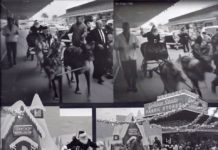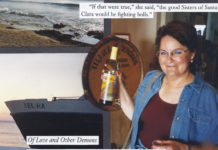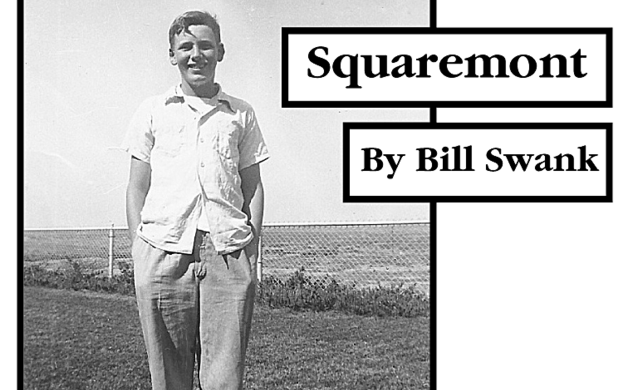
2,500 years ago, the Greek philosopher Heraclitus the Obscure understood that the world is in a constant state of change.
Almost fifty years ago, as an obscure probation officer supervising a caseload of obscure juvenile delinquents in booming Clairemont, I understood the world was in a constant state of crazy which hasn’t changed at all.
What has changed is the term “juvenile delinquents.” JDs are now known as “justice involved youths.”
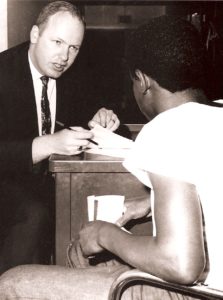
As a young probation officer, I quickly learned the futility of discussing cause and effect with youthful offenders. Did the kid understand what he had done wrong? The answer was always the same: “I got caught.” Incidentally, I used the male pronoun, because, in the 1960s, very few delinquents were girls.
Last month, I bought a case of beer at CVS in The Village and was asked to show my driver license. I am and look 77 years old. That is crazy, stupid change.
As I walked outside into the parking lot, a man abruptly applied his brakes, backed up his pick-up and said, “Hi, Mr. Swank. I’m glad I saw you, I wanted to say goodbye, because I’m leaving Clairemont. It’s gotten too crazy.”
In the early 1970s, this salt-and-pepper-bearded senior was a teenager and I was his probation officer.
Clairemont was a lot crazier back then and it was an era that predated “Fast Times at Ridgemont High.”
At the time, Clairemont had the highest burglary rate in San Diego. Dopers ransacked homes to find money for drugs. Guns were rare, but aggressive, anti-social thugs were common. A few years later, we stopped locking up kids who were “beyond the control of their parents,” because space was needed in Juvenile Hall for more serious offenders.
Plain and simple, drugs were the problem.
- In 1971, while checking on my kids at Clairemont High School, one staggered into the office and slurred, “Hi, Mr. Bill.” His prior history included getting busted for smoking dope at a La Jolla love-in, sniffing glue behind the PB Rec Center, high on reds (Seconal, a barbiturate) at Clairemont High School, high a second time on reds at CHS, drunk on beer and wine in a car, wasted on reds at the South Clairemont Rec Center.
Actually, he was a nice kid who never hurt anyone, but himself. As we headed to my car, he wandered off. I called him over and he willingly complied. We didn’t cuff kids in those days. Prior to taking him to Juvenile Hall, we stopped at his home so his mother could see his condition. She denied that he was under the influence and blamed his actions on black lights and rock’n roll. He would be dead before age 21.
- Another good-looking kid who went to Clairemont High and his older 17-year-old brother both got kicked out of their home. Their stepfather beat them for years and the mother sided with her brutal husband. These kids were different, because they had a gardening service and were actually making it on their own. Not surprisingly, the younger brother (my kid) had a propensity for violence. While under my supervision, he was accused of stealing incense sticks from a PB head shop and beating the clerk into unconsciousness. Violence would haunt him.
In 1980, I read in the newspaper that he was found stabbed and beaten to death in Golden Hill. I assumed it was a drug deal that went bad. He was only 26 years old.
- Three doper friends were smoking weed and hunting rabbits in the canyon with .22s. One was accidentally shot and died. The other two ended up on probation. They were small-time thieves and big-time potheads. One of the kids was likable; the other was dislikable. The likable kid continued to get into trouble and went to Rancho del Campo. Somehow, the other kid found a girlfriend who did more to straighten him out than I ever could. He got off probation early, but was killed at 20 when he walked into the path of a speeding vehicle while under the influence of drugs.
- Before taking over the Clairemont caseload, I’d worked five years at Juvenile Hall. I remembered a beautiful girl who had been in the Hall twice for “beyond control” behavior. She came from a terrible home environment. Her father was an ex-con; her mother an alcoholic. She was on my caseload in 1971 and I found a foster home for her. When things didn’t work out, she went to live with her maternal grandmother who was nuts. Two years later, I learned that she murdered her grandmother.
- Four Clairemont High kids were arrested for possession of marijuana following a concert at the Sports Arena. Three of them were good kids, but the fourth was sullen and hostile. Several years later, he was killed while robbing a Clairemont gas station at gunpoint.
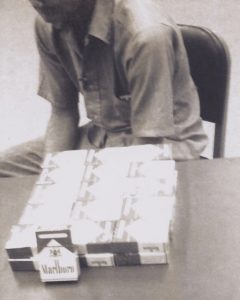
- The punk in this SDPD Polaroid stole 31 packs of Marlboro cigarettes from a Clairemont convenience store. The picture was taken at the northern substation as evidence. Although the cigarettes were hidden inside his shirt (it was a time before kids wore backpacks), he denied stealing them. His mother complained that the police and probation officer were always harassing her son.
- I found 4 grams of marijuana under another ward’s mattress and told him we were going to Juvenile Hall. The problem was his dog, a barking, snarling Doberman Pinscher standing on the kid’s bed. I ordered him to put the dog in the garage. On the way to Juvie, I learned he was the cousin of the kid who was accidentally killed while smoking dope and hunting rabbits. He wanted to quit drugs, but couldn’t. A weekend in Juvenile Hall produced a dramatic change in his behavior. He attended school regularly and stayed out of trouble. Perhaps holding the kid accountable was therapeutic.
- I had another kid who was an habitual truant. His mother allowed him to stay home when he didn’t want to go to school… which was all of the time. When I got his case, I warned him that if he wasn’t in school, he was going to the Hall. The next day, I checked with the attendance secretary at Hale Junior High School. The kid was absent, so I went to his apartment. He was hiding in the closet. His mother began screaming and crying.
As we approached Juvenile Hall, the boy told me that he didn’t go to school, because he didn’t have shoes. I took him inside and got a pair of sneakers. Being in custody had visibly shaken him. He promised to go to class if I would give him another chance.
Because he had missed so much school, he was placed in special education. In reality, he was a very nice kid and a good-looking kid who quickly became a hit with the girls. Three years later, I was invited to his high school graduation from Madison High School. His mother no longer hated me.
- Undercover cops and drug busts were popular during this era. I processed the first search warrants for undercover cops in the late 1960s. Clairemont was targeted in 1970 and several sellers were on my caseload. One had sold LSD to an officer. What made this kid unusual was his blond crewcut. His father was in the Navy and wouldn’t allow longhair. This “pusher” was good to his mother and little sister. He wore clean clothes and got good grades.
One day, while driving on Doliva Drive beside Madison High School, I noticed the longhair pukes selling dope along the fence. One kid stood out from the rest. He had a blond crewcut and clean clothes. I pulled over and saw bills inside his shirt pocket. A search revealed he was in possession of several bindles that turned out to be PCP.
The kid went to Rancho del Campo and I always felt bad about it. So many punks get to slide, but I exercised close supervision. It was very unusual for probation officers to put their wards in Juvenile Hall in the early 1970s. I was disgusted by other officers who did nothing when their kids committed additional crimes while on probation.
- In the middle 1980s, a young man was installing drapes in our home and asked my wife if she was married to a probation officer. As a youth, I had caught him with stolen motorcycles in his extra room. He went to Rancho del Campo. I remembered him immediately and was glad he’d become a useful member of society. He bore no ill will toward me for busting him.
- Upon reaching adulthood, several of my former wards would contact me when they had minor scrapes with the law or problems in their marriages and jobs. One showed up at my door with his two young children. Eventually, he admitted that he’d “kidnapped” them during a visitation and there was a warrant for his arrest. I called his ex-wife and she wasn’t surprised to learn he had come to me. When this kid turned 18, I had sent him a birthday card and enclosed a dollar. His mother told me it was the only birthday card he’d received in his life.
I returned the kids to the mother’s apartment. The last time I saw him was in the 1990s. I was then working in our adult division and he was on his way to honor camp for a drug offense. A short time later, I heard he was killed in a drug deal that went bad.
Looking back on my career, I tried to change kids into law-abiding citizens. I’m not sure of my impact, but apparently some did change.
The man in the CVS parking lot credited me with straightening him out. He was from a broken home and claimed to be afraid of me. In my memory, he was a just kid who made a mistake.
Probation officers can help the kids who want to change, but some never change. They never appreciated our intrusion into their lives, either.
Now, we’re all on Social Security…
Email:Bill@ClairemontTimes.com

